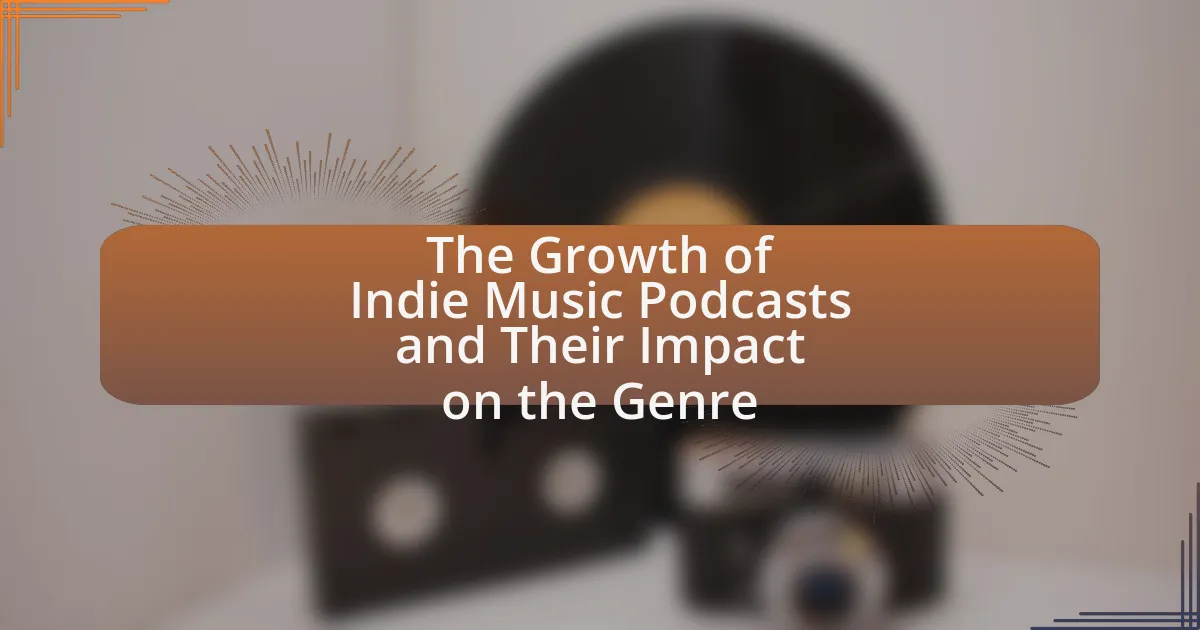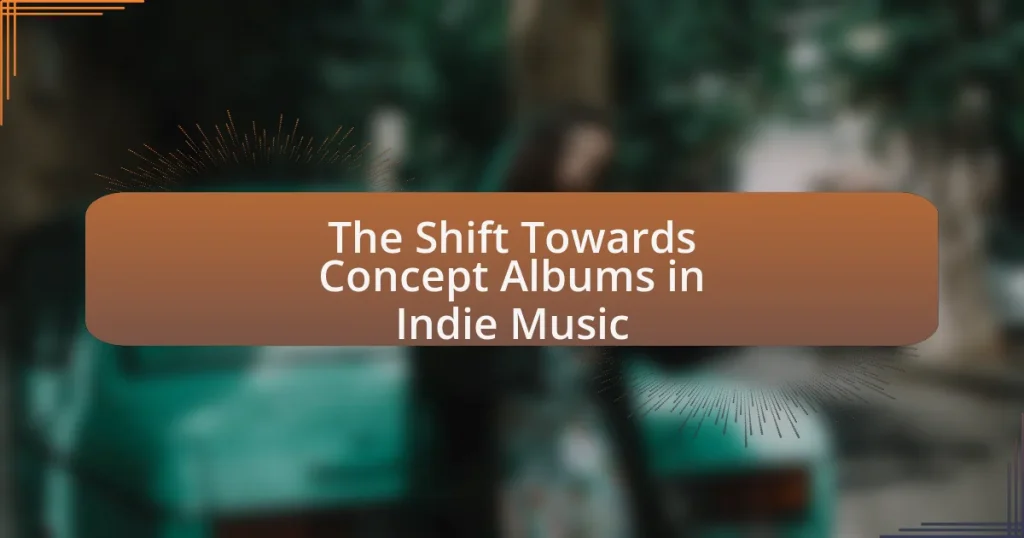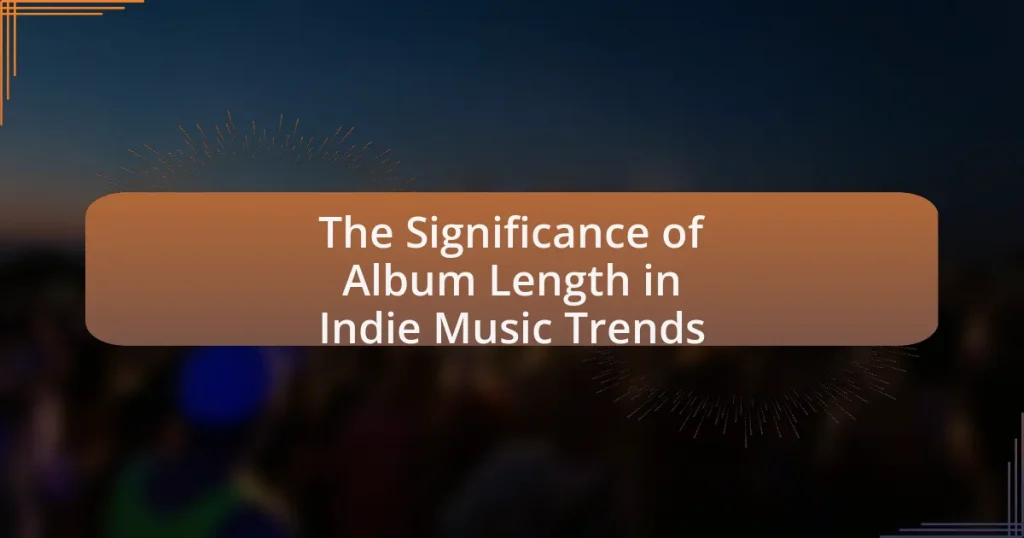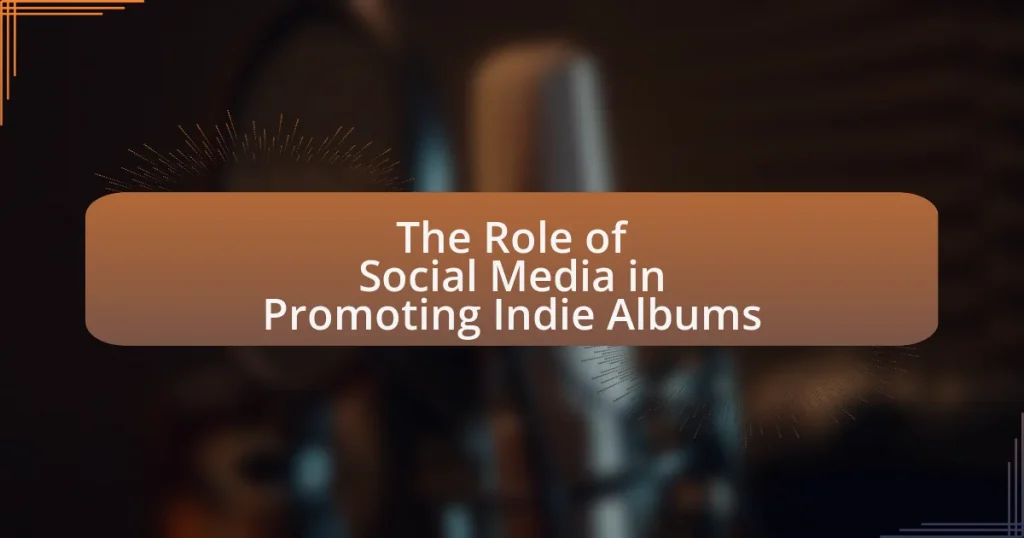Indie music podcasts are audio programs dedicated to independent music artists and the indie music scene, facilitating discussions, interviews, and music discovery. Their growth is driven by the rising popularity of podcasting, with over 50% of the U.S. population engaging with podcasts, and the increasing visibility of indie music through social media and streaming platforms. The article explores the evolution of indie music podcasts, technological advancements that have made production more accessible, and the factors contributing to their popularity, including community engagement and niche content. Additionally, it addresses the challenges faced by indie music podcasts, such as funding and competition, while highlighting their significant impact on emerging artists and listener preferences within the genre.
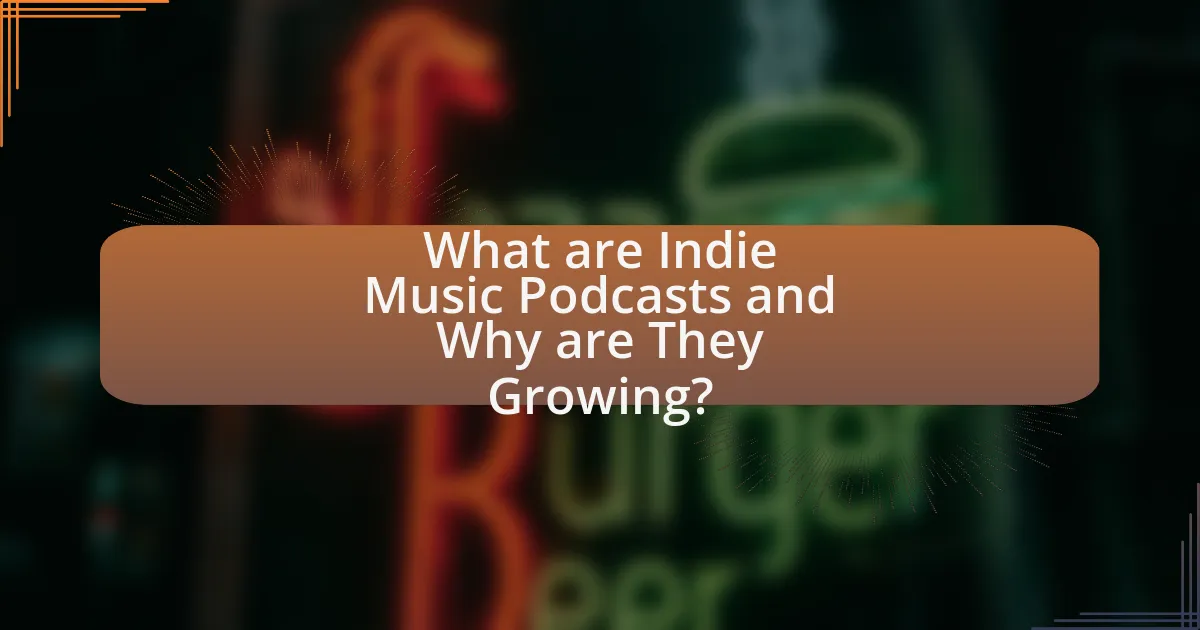
What are Indie Music Podcasts and Why are They Growing?
Indie music podcasts are audio programs that focus on independent music artists and the broader indie music scene, providing a platform for discussion, interviews, and music discovery. Their growth can be attributed to the increasing popularity of podcasting as a medium, with statistics showing that over 50% of the U.S. population has listened to a podcast, and indie music’s rising visibility through social media and streaming platforms, which has created a demand for content that highlights lesser-known artists. Additionally, the intimate nature of podcasts allows listeners to connect with artists on a personal level, fostering a community around indie music.
How have indie music podcasts evolved over the years?
Indie music podcasts have evolved significantly over the years, transitioning from niche platforms to mainstream media outlets. Initially, these podcasts primarily featured independent artists and underground music scenes, often produced by enthusiasts with limited resources. As technology advanced and podcasting became more accessible, the quality of production improved, leading to a rise in professional-grade content.
By the mid-2010s, platforms like Spotify and Apple Podcasts began to recognize the potential of indie music podcasts, resulting in increased visibility and sponsorship opportunities. This shift allowed hosts to feature a wider array of artists and genres, fostering a more diverse listening experience. According to a 2021 report by Edison Research, the number of podcast listeners in the U.S. grew to over 100 million, indicating a broader acceptance of the medium, including indie music-focused shows.
Furthermore, the integration of social media has enabled indie music podcasts to cultivate dedicated communities, allowing listeners to engage directly with artists and hosts. This evolution reflects a growing recognition of indie music’s cultural significance and the role of podcasts in promoting emerging talent.
What technological advancements have contributed to the rise of indie music podcasts?
Technological advancements such as affordable recording equipment, user-friendly editing software, and widespread access to high-speed internet have significantly contributed to the rise of indie music podcasts. The availability of high-quality microphones and portable recording devices allows independent creators to produce professional-sounding content without substantial financial investment. Additionally, intuitive editing software like Audacity and GarageBand enables podcasters to easily edit and enhance their audio, making production more accessible. Furthermore, the proliferation of high-speed internet has facilitated the distribution and streaming of podcasts, allowing indie music creators to reach a global audience through platforms like Spotify and Apple Podcasts. These advancements collectively empower indie musicians and enthusiasts to share their passion and connect with listeners effectively.
How has the accessibility of podcasting platforms influenced indie music podcast growth?
The accessibility of podcasting platforms has significantly accelerated the growth of indie music podcasts by providing creators with low-cost, user-friendly tools to distribute their content. This democratization of media allows independent artists and podcasters to reach wider audiences without the barriers traditionally associated with music distribution, such as record label contracts or expensive production costs. According to a 2022 report by Edison Research, over 80 million Americans listen to podcasts monthly, indicating a substantial audience for indie music content. Additionally, platforms like Spotify and Apple Podcasts have integrated features that promote indie podcasts, further enhancing their visibility and listener engagement.
What factors are driving the popularity of indie music podcasts?
The popularity of indie music podcasts is driven by the increasing demand for niche content and the desire for authentic artist connections. As listeners seek personalized music experiences, indie music podcasts provide a platform for emerging artists to share their stories and music, fostering a sense of community. Additionally, the rise of streaming services has made it easier for indie artists to reach audiences, further fueling interest in podcasts that highlight their work. According to a 2022 report by Edison Research, 41% of podcast listeners are interested in music-related content, indicating a significant market for indie music podcasts.
How do indie music podcasts cater to niche audiences?
Indie music podcasts cater to niche audiences by focusing on specific genres, subcultures, and local music scenes that mainstream media often overlooks. These podcasts create tailored content that resonates with dedicated listeners, featuring in-depth interviews with independent artists, discussions about lesser-known tracks, and explorations of unique musical styles. For example, podcasts like “All Songs Considered” and “Song Exploder” highlight emerging artists and provide insights into their creative processes, thereby fostering a community around niche interests. This targeted approach not only attracts passionate fans but also encourages engagement through listener feedback and participation, reinforcing the connection between the podcast and its audience.
What role does community engagement play in the success of indie music podcasts?
Community engagement is crucial for the success of indie music podcasts as it fosters listener loyalty and enhances content relevance. Engaged communities provide feedback, share episodes, and create a sense of belonging, which can lead to increased listenership and support. For instance, podcasts that actively involve their audience through social media interactions or live events often see higher engagement metrics, such as downloads and shares. Research indicates that podcasts with strong community ties can experience up to 50% more listener retention compared to those without such engagement strategies. This demonstrates that community involvement not only enriches the podcasting experience but also directly contributes to its growth and sustainability.
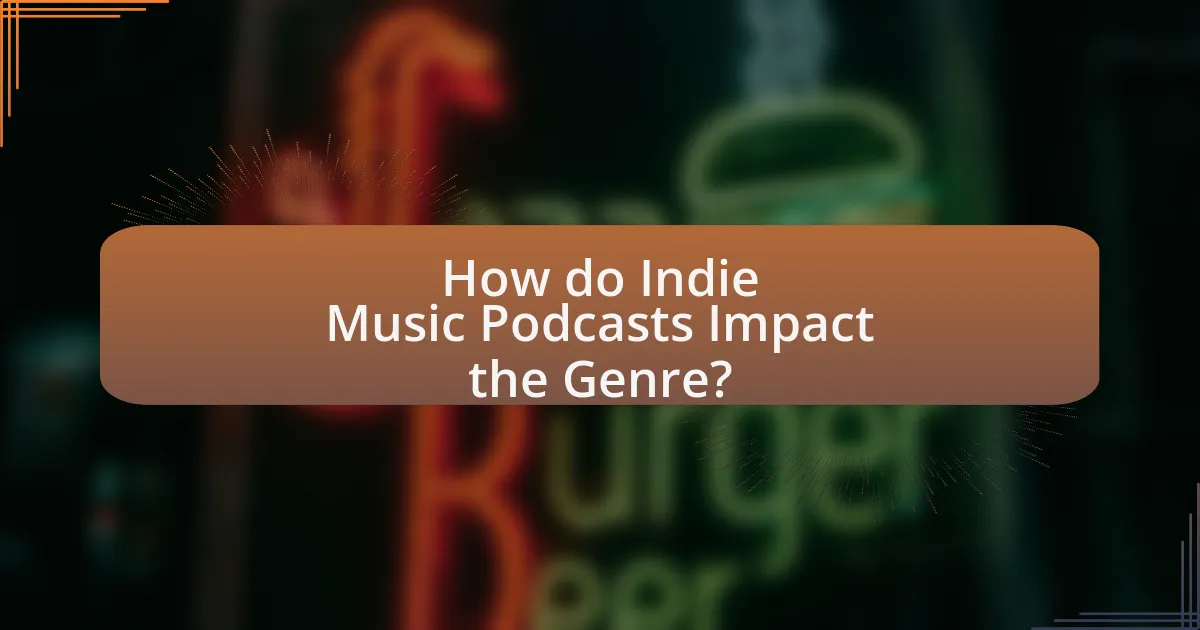
How do Indie Music Podcasts Impact the Genre?
Indie music podcasts significantly impact the genre by providing a platform for emerging artists and fostering community engagement. These podcasts often feature interviews with independent musicians, allowing listeners to discover new talent and gain insights into the creative process. According to a 2021 survey by the Podcast Host, 54% of podcast listeners reported discovering new music through podcasts, highlighting their role in promoting indie artists. Additionally, the interactive nature of podcasts encourages listener participation, creating a sense of belonging among fans and artists alike, which further strengthens the indie music community.
What influence do indie music podcasts have on emerging artists?
Indie music podcasts significantly influence emerging artists by providing them with a platform for exposure and audience engagement. These podcasts often feature interviews, music showcases, and discussions that highlight new talent, allowing artists to reach listeners who are interested in discovering fresh sounds. For instance, a study by the University of Southern California found that 70% of podcast listeners reported discovering new music through podcasts, demonstrating their effectiveness in promoting emerging artists. Additionally, podcasts can foster community and networking opportunities, as artists connect with hosts and other musicians, further enhancing their visibility in the indie music scene.
How do podcasts provide exposure for new indie musicians?
Podcasts provide exposure for new indie musicians by featuring their music, interviews, and discussions about their work, which helps to reach a broader audience. Many podcasts focus specifically on indie music, allowing hosts to introduce listeners to emerging artists and their unique sounds. For instance, according to a 2021 report by Edison Research, 41% of podcast listeners discover new music through podcasts, highlighting their role in promoting lesser-known musicians. Additionally, podcasts often share links to artists’ social media and streaming platforms, facilitating direct engagement between musicians and potential fans.
What role do interviews and discussions play in promoting indie music culture?
Interviews and discussions play a crucial role in promoting indie music culture by providing platforms for artists to share their stories and connect with audiences. These formats allow musicians to express their creative processes, influences, and challenges, fostering a deeper understanding and appreciation of their work among listeners. For instance, podcasts like “Song Exploder” dissect songs with the artists themselves, revealing the intricacies of indie music creation and enhancing listener engagement. This direct interaction not only builds a community around indie music but also encourages the discovery of new artists, thereby expanding the genre’s reach and influence.
How do indie music podcasts shape listener preferences?
Indie music podcasts shape listener preferences by providing curated content that introduces audiences to lesser-known artists and genres. These podcasts often feature interviews, music reviews, and discussions that highlight emerging trends, which can influence listeners’ musical tastes and preferences. Research indicates that listeners who engage with indie music podcasts are more likely to explore new music and artists, as these platforms create a sense of community and shared discovery among fans. For instance, a study by the Pew Research Center found that 49% of podcast listeners reported discovering new music through podcasts, demonstrating their significant role in shaping listener preferences.
What trends in music consumption are influenced by indie music podcasts?
Indie music podcasts influence several trends in music consumption, notably the rise of niche music discovery and increased listener engagement. These podcasts often feature lesser-known artists and genres, allowing listeners to explore diverse musical landscapes beyond mainstream offerings. According to a 2022 report by the Infinite Dial, 54% of podcast listeners have discovered new music through podcasts, highlighting their role in shaping music preferences. Additionally, indie music podcasts foster community interaction through social media platforms, encouraging discussions and recommendations that further drive music consumption trends.
How do podcasts affect the way listeners discover new music?
Podcasts significantly enhance the way listeners discover new music by providing curated content that highlights emerging artists and genres. Through interviews, music reviews, and playlists, podcasts create a platform for indie musicians to reach wider audiences, often featuring tracks that may not receive mainstream radio play. For instance, a study by the Podcast Host found that 54% of podcast listeners reported discovering new music through podcasts, indicating their effectiveness as a discovery tool. This trend is particularly evident in indie music podcasts, which focus on niche genres and underground talent, thereby fostering a deeper connection between listeners and new music.
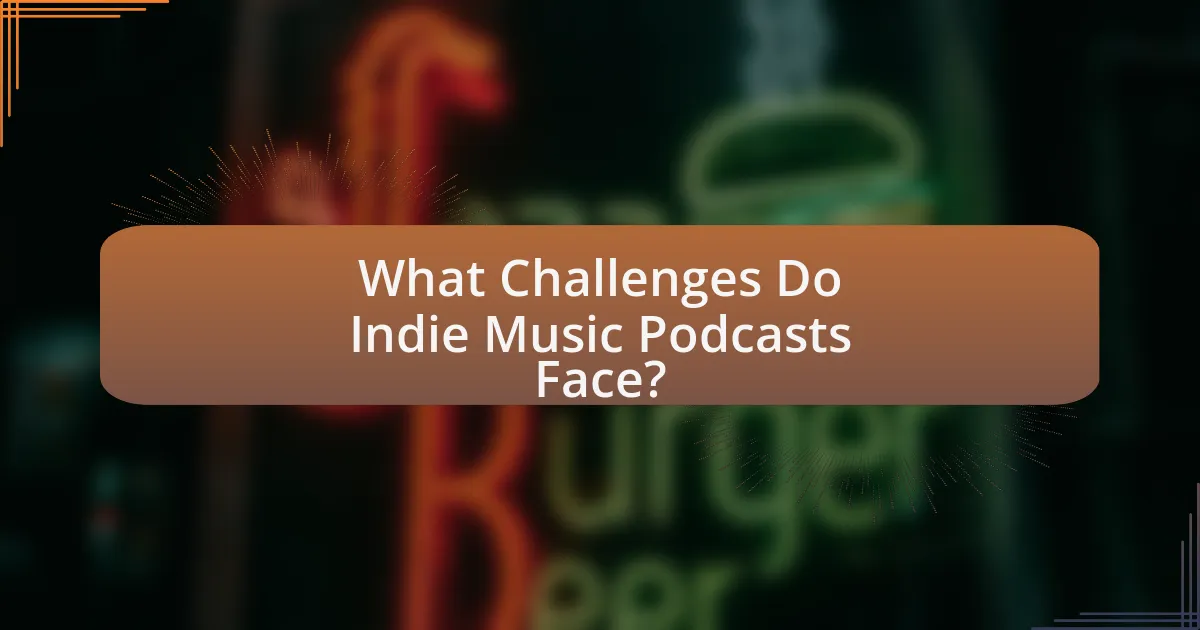
What Challenges Do Indie Music Podcasts Face?
Indie music podcasts face several challenges, including limited funding, competition for audience attention, and difficulties in content distribution. Limited funding restricts the ability to produce high-quality content and market the podcast effectively, which is crucial for attracting listeners. Competition for audience attention is intense, as numerous podcasts vie for the same listener base, making it difficult for indie podcasts to stand out. Additionally, content distribution challenges arise from navigating various platforms and algorithms that may not favor smaller creators, hindering their reach. These factors collectively impact the growth and sustainability of indie music podcasts in a crowded media landscape.
What are the common obstacles in producing indie music podcasts?
Common obstacles in producing indie music podcasts include limited funding, lack of technical expertise, and difficulties in content promotion. Limited funding restricts access to quality recording equipment and marketing resources, which are essential for high production value. Lack of technical expertise can hinder the ability to effectively edit audio and utilize podcasting platforms, leading to subpar episodes. Additionally, difficulties in content promotion arise from the saturated podcast market, making it challenging for indie creators to reach their target audience and gain visibility. These factors collectively impede the growth and sustainability of indie music podcasts.
How do funding and monetization issues affect indie music podcasts?
Funding and monetization issues significantly hinder the growth and sustainability of indie music podcasts. Limited financial resources restrict the ability of creators to invest in quality production, marketing, and distribution, which are essential for attracting and retaining listeners. According to a 2021 report by the Interactive Advertising Bureau, 60% of podcasters cited monetization challenges as a primary barrier to growth, indicating that without effective funding strategies, many indie music podcasts struggle to reach wider audiences and compete with larger, well-funded entities.
What challenges do podcasters face in maintaining content quality?
Podcasters face several challenges in maintaining content quality, including limited resources, audience engagement, and content consistency. Limited resources often result in inadequate funding for professional equipment and editing, which can compromise audio quality. Audience engagement is crucial; podcasters must continually create compelling content to retain listeners, which can be difficult in a saturated market. Additionally, maintaining content consistency is essential for building a loyal audience, yet it can be challenging due to time constraints and the need for ongoing research and creativity. These factors collectively impact the overall quality of podcast content, making it essential for podcasters to navigate these challenges effectively.
How can indie music podcasts overcome these challenges?
Indie music podcasts can overcome challenges by leveraging community engagement and utilizing social media for promotion. Engaging with listeners through interactive platforms fosters a loyal audience, while social media allows for targeted outreach and collaboration with artists. According to a 2021 survey by Edison Research, 80% of podcast listeners discover new shows through social media, highlighting its effectiveness in reaching potential audiences. By focusing on these strategies, indie music podcasts can enhance visibility and build a supportive listener base.
What strategies can podcasters use to enhance audience engagement?
Podcasters can enhance audience engagement by incorporating interactive elements such as listener polls, Q&A sessions, and social media integration. These strategies allow podcasters to directly involve their audience in the content creation process, fostering a sense of community and investment in the podcast. For instance, a study by Edison Research found that 61% of podcast listeners enjoy engaging with hosts through social media, indicating that interactive strategies can significantly boost listener loyalty and participation.
How can collaboration with artists improve podcast visibility?
Collaboration with artists can significantly improve podcast visibility by leveraging the artists’ existing fan bases and social media reach. When a podcast features an artist, it often results in cross-promotion, where the artist shares the episode with their followers, thereby introducing the podcast to a wider audience. For instance, a study by the Podcast Host found that episodes featuring well-known guests can increase listener engagement by up to 30%. Additionally, collaborations can enhance content quality, making the podcast more appealing and shareable, which further boosts visibility.
What are the best practices for creating a successful indie music podcast?
To create a successful indie music podcast, focus on consistent content quality, audience engagement, and effective promotion. Consistent content quality involves delivering well-researched episodes that feature diverse indie artists, ensuring that each episode maintains high audio standards and engaging storytelling. Audience engagement can be enhanced through social media interaction, listener feedback, and incorporating audience suggestions into episodes, which fosters a community around the podcast. Effective promotion includes utilizing platforms like Instagram, Twitter, and music forums to reach potential listeners, as well as collaborating with indie artists and other podcasters to expand your audience base. According to a 2021 report by Edison Research, 41% of Americans aged 12 and older have listened to a podcast in the past month, indicating a growing audience for niche content like indie music podcasts.
How can podcasters effectively market their shows to reach a wider audience?
Podcasters can effectively market their shows to reach a wider audience by leveraging social media platforms, collaborating with other creators, and optimizing their content for search engines. Social media allows podcasters to engage directly with listeners, share episode highlights, and create community around their shows, which can lead to increased visibility. Collaborating with other podcasters or influencers in the indie music scene can introduce their content to new audiences, as partnerships often result in cross-promotion. Additionally, optimizing podcast titles, descriptions, and episode notes with relevant keywords enhances discoverability on platforms like Apple Podcasts and Spotify, making it easier for potential listeners to find their shows. According to a 2021 report by Edison Research, 41% of podcast listeners discover new shows through recommendations on social media, highlighting the effectiveness of these marketing strategies.
What tips can help maintain consistent content quality and listener interest?
To maintain consistent content quality and listener interest in indie music podcasts, creators should prioritize thorough research and audience engagement. Thorough research ensures that the content is accurate, relevant, and insightful, which enhances the overall quality. Engaging with the audience through feedback, social media interactions, and incorporating listener suggestions fosters a sense of community and keeps the content aligned with listener preferences. According to a study by Edison Research, 75% of podcast listeners appreciate when hosts respond to their feedback, indicating that audience involvement significantly boosts interest and loyalty.
